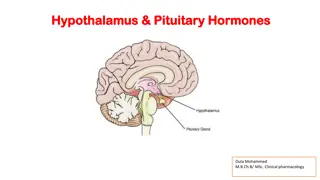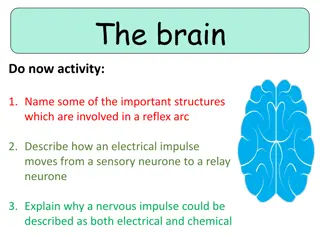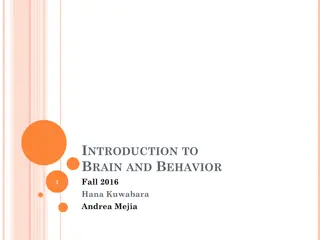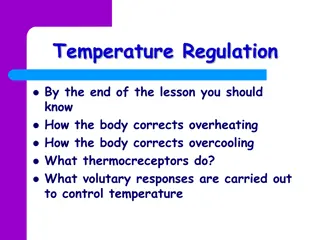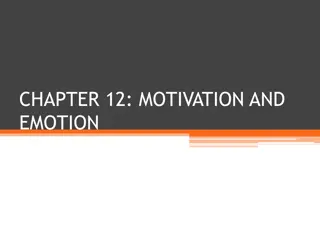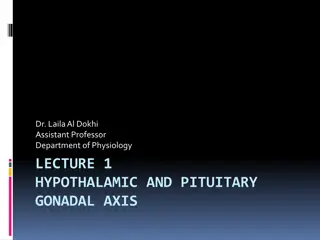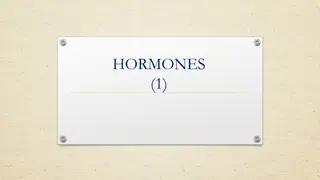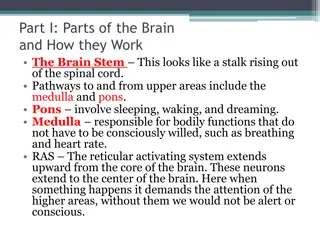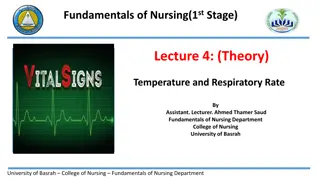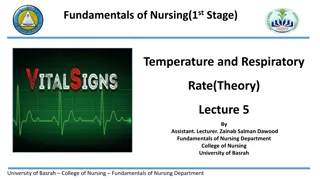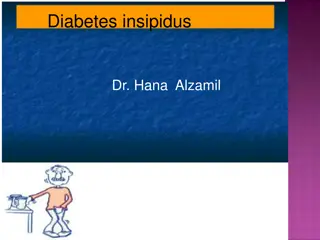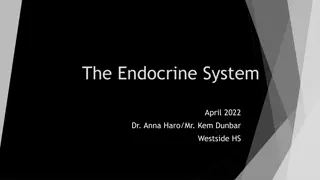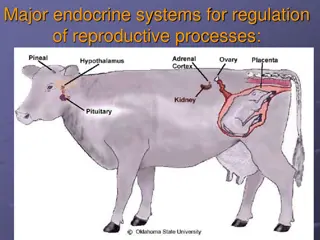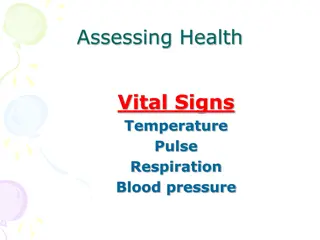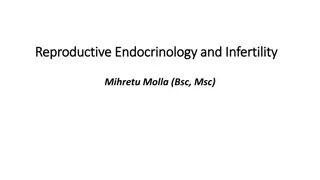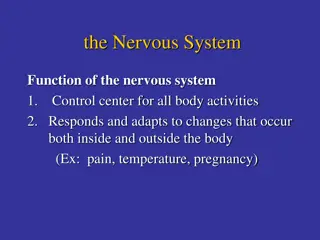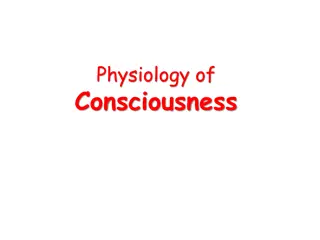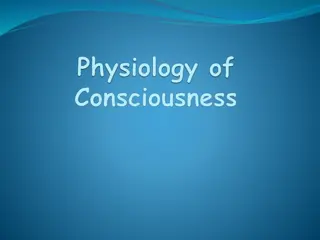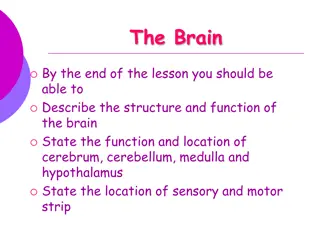Hypothalamus and Pituitary Hormones in Clinical Pharmacology
Peptides and glycoproteins are secreted by the hypothalamus and pituitary, regulating anterior pituitary hormones. Hormones like adrenocorticotropic hormone (ACTH) and corticotropin-releasing hormone (CRH) play crucial roles. Synthetic adrenocorticosteroids have limited the use of corticotropin for
1 views • 28 slides
The Structures and Functions of the Brain
Delve into the intricate world of the brain, learning about important structures like the hypothalamus and cerebral cortex. Discover how electrical impulses move through neurons and understand the dual nature of nervous impulses. Engage in activities to map brain functions and test your knowledge wi
1 views • 23 slides
The Brain and Behavior in Fall 2016
This content delves into the intricacies of the brain and behavior, covering topics such as the organization of the brain, the nervous system, brain stem functions, disorders of the cerebellum, and the forebrain components. It provides a detailed exploration of the hindbrain and midbrain structures,
1 views • 30 slides
Body Temperature Regulation
Explore how the body maintains its internal temperature through mechanisms such as correcting overheating and overcooling, the role of thermoreceptors, and voluntary responses that help control temperature. Discover the importance of regulating internal body temperature for optimal enzyme-catalyzed
2 views • 18 slides
Cutaneous Circulation and Blood Supply in Different Body Regions
Cutaneous circulation plays a vital role in supplying blood to the skin, with variations in apical and non-apical regions of the body. The blood flow is regulated by neural, thermal, and metabolic factors, and controlled by sympathetic fibers. Sympathetic vasoconstriction and vasodilation affect the
0 views • 19 slides
Motivation and Emotion Theories
The chapter delves into various theories of motivation, including instinct theory, drive-reduction theory, incentive theory, and cognitive theory, explaining how internal states and external stimuli influence behavior. It also explores biological and social motives such as hunger and the roles of di
1 views • 29 slides
The Hypothalamic-Pituitary-Gonadal Axis in Reproductive Physiology
Explore the intricate relationship between the hypothalamus, pituitary gland, and gonads in regulating reproductive functions. Learn about hormone definitions, hypothalamic-pituitary interactions, gonadotropic hormones, and feedback mechanisms crucial for reproductive control.
0 views • 13 slides
Hormones and their Role in the Body
Hormones are chemical messengers that play a crucial role in regulating various metabolic functions in the body. They are transported through the bloodstream to tissues and organs, affecting processes like growth, metabolism, and reproduction. Some hormones have autocrine and paracrine effects in ad
0 views • 25 slides
Parts of the Brain and Their Functions
The brain consists of different parts with unique roles. The Brain Stem controls essential functions like breathing, while the Cerebellum aids in balance and muscle coordination. The Thalamus directs sensory messages, the Hypothalamus regulates survival drives, and the Amygdala evaluates emotional r
0 views • 9 slides
Body Temperature Regulation in Nursing Practice
Body temperature regulation is a vital aspect of nursing care, involving the balance between heat production and loss. The core body temperature is controlled by the hypothalamus, responding to thermal receptors and hormonal cues to maintain homeostasis. Heat production mechanisms such as metabolism
1 views • 31 slides
Body Temperature Regulation in Nursing Practice
Learn about the fundamentals of body temperature regulation in nursing, including the physiology of heat production and loss, the role of the hypothalamus, and the importance of maintaining core body temperature. Explore how metabolism, hormones, and physical exertion impact body temperature, as wel
0 views • 32 slides
Diabetes Insipidus: Types, Causes, and Symptoms
Diabetes insipidus (DI) is a disorder caused by a deficiency of anti-diuretic hormone (ADH), leading to the excessive passage of diluted urine. Central DI results from pituitary or hypothalamus issues, while nephrogenic DI occurs when the kidneys fail to respond to ADH. Common causes include brain t
0 views • 22 slides
The Endocrine System: Functions, Organs, and Disorders
The endocrine system, essential for bodily functions and growth, consists of key parts such as the hypothalamus, pituitary gland, thyroid gland, and more. It helps maintain homeostasis and can be affected by environmental factors like drugs and stress, leading to conditions such as Cushing syndrome.
0 views • 9 slides
The Endocrine System: Functions and Glands Explained
Explore the intricacies of the endocrine system with a focus on its functions such as metabolism, growth, emotions, and more. Learn about key endocrine glands like the hypothalamus and pituitary, their roles in hormone regulation, and their impact on various bodily processes. Discover the significan
0 views • 17 slides
Central Controls of Food Intake and Appetite Regulation
Exploring the intricate mechanisms behind food intake and appetite regulation, this informative content delves into the pivotal role of the brain regions such as the hypothalamus and brainstem. It discusses how peripheral signals, neural pathways, and neuropeptides collaborate in orchestrating hunge
0 views • 13 slides
Endocrine Systems in Reproductive Regulation
The endocrine system plays a crucial role in regulating reproductive processes by secreting hormones that influence cellular activity. This system involves ductless glands like the hypothalamus, pituitary gland, and other endocrine glands working together in a feedback mechanism. Hormones of various
0 views • 19 slides
Stress Response and its Impact on the Body
Stressful situations trigger a cascade of physiological changes known as the "fight-or-flight" response. The body's hormonal and physiological reactions help in coping with threats, but overreactions to non-life-threatening stressors can occur. The brain's command center, the hypothalamus, communica
0 views • 10 slides
Body Temperature Regulation and Factors Affecting It
Body temperature regulation is a complex process involving the balance of heat production and loss. Factors like age, hormones, stress, and environmental changes can influence body temperature. Heat production is affected by factors such as basal metabolic rate, muscle activity, fever, and sympathet
0 views • 24 slides
Reproductive Endocrinology and Infertility
Amenorrhea is classified into primary and secondary types with different causes like physiological and pathological factors affecting the hypothalamus, pituitary, ovaries, and uterus. Understanding the reasons behind amenorrhea is crucial due to its implications on fertility, estrogen deficiency-rel
0 views • 66 slides
The Role of Hypothalamus in Regulating Vital Functions
The hypothalamus, located at the base of the brain, plays a crucial role in regulating various bodily functions such as blood pressure, heart rate, temperature, hunger, and sleep. It also influences emotions like pleasure, fear, and anger. Learn about the hormones produced by the hypothalamus and th
0 views • 11 slides
the Nervous System
The nervous system serves as the control center for all body activities, responding and adapting to internal and external changes. It comprises the Central Nervous System, which includes the brain with its various regions, such as the cerebrum, diencephalon, brainstem, and cerebellum. The cerebrum,
0 views • 23 slides
ENDOCRINOLOGY
In this informational content, you will learn about endocrinology, focusing on the pituitary glands, anterior pituitary hormones, growth hormone functions, bone growth mechanisms, and more. Explore the physiological functions, regulation, and factors influencing hormone secretions. Discover the conn
0 views • 35 slides
Regulation of Feed Intake
Chemicals known as neurotransmitters play a crucial role in regulating feed intake through neuropeptides in the brainstem and hypothalamus. This presentation explores the short-term and long-term systems that control food intake, discussing orexigenic and anorexigenic neuropeptides. Understanding th
0 views • 46 slides
Homeostasis and Circadian Rhythms
Homeostasis is the state of equilibrium maintained through internal control systems like receptors, control centers, and effectors. Feedback mechanisms, such as negative and positive feedback, help regulate processes like blood glucose levels and childbirth. Circadian rhythms, controlled by the body
0 views • 35 slides
Consciousness
The levels of consciousness from normal to coma, delve into the brain structures involved in the conscious state, and learn about the physiology of consciousness encompassing the brain stem, reticular formation, thalamus, hypothalamus, and more.
0 views • 33 slides
Levels of Consciousness and Brain Structures
This content explores the levels of consciousness, including normal consciousness, clouded consciousness, sleep, and coma, along with the brain structures involved in maintaining consciousness such as the brain stem, reticular formation, thalamus, and hypothalamus. It also discusses the role of the
0 views • 41 slides
The Brain
Discover the intricate structure and functions of the brain, including the cerebrum, cerebellum, medulla, and hypothalamus. Learn about the sensory and motor strips as well. Dive into the fascinating world of neuroscience and understand how the brain weighs about 1300-1400g with around 100 billion n
0 views • 11 slides
